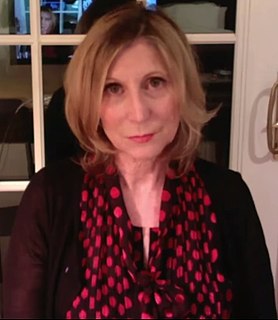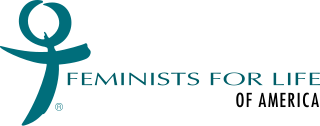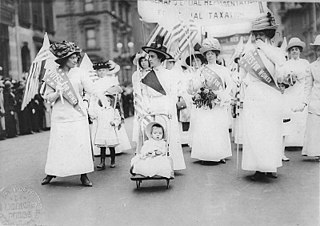Related Research Articles

Betty Friedan was an American feminist writer and activist. A leading figure in the women's movement in the United States, her 1963 book The Feminine Mystique is often credited with sparking the second wave of American feminism in the 20th century. In 1966, Friedan co-founded and was elected the first president of the National Organization for Women (NOW), which aimed to bring women "into the mainstream of American society now [in] fully equal partnership with men".

Concerned Women for America (CWA) is a socially conservative, evangelical Christian non-profit women's activist group in the United States. Headquartered in Washington D.C., the CWA is involved in social and political movements, through which it aims to incorporate Christian ideology. The group is primarily led by women for women, but it welcomes men who support its beliefs and efforts.
Individualist feminism, sometimes also grouped with libertarian feminism, is a feminist tradition that emphasize individualism, personal autonomy, choice, consent, freedom from state-sanctioned discrimination on the basis of sex or gender, and equality under the law.

Christina Marie Hoff Sommers is an American author and philosopher. Specializing in ethics, she is a resident scholar at the American Enterprise Institute. Sommers is known for her critique of contemporary feminism. Her work includes the books Who Stole Feminism? (1994) and The War Against Boys (2000). She also hosts a video blog called The Factual Feminist.

Feminists for Life of America (FFL) is a non-profit, anti-abortion feminist, non-governmental organization (NGO). Established in 1972, and now based in Alexandria, Virginia, the organization describes itself as "shaped by the core feminist values of justice, non-discrimination, and non-violence". FFL publishes a biannual magazine, The American Feminist, and aims to reach young women, college students in particular.
Anti-abortion feminism or pro-life feminism is the opposition to abortion by some feminists. Anti-abortion feminists may believe that the principles behind women's rights also call them to oppose abortion on right to life grounds and that abortion hurts women more than it benefits them.
The Religious Coalition for Reproductive Choice (RCRC) is an abortion rights organization founded in 1973 by clergy and lay leaders from mainline denominations and faith traditions to create an interfaith organization following Roe v. Wade, the 1973 U.S. Supreme Court decision legalizing abortion in the U.S. In 1993, the original name - the Religious Coalition for Abortion Rights (RCAR) - was changed to the Religious Coalition for Reproductive Choice.
Christian feminism is a school of Christian theology which seeks to advance and understand the equality of men and women morally, socially, spiritually, and in leadership from a Christian perspective. Christian feminists argue that contributions by women, and an acknowledgment of women's value, are necessary for a complete understanding of Christianity. Christian feminists believe that God does not discriminate on the basis of biologically-determined characteristics such as sex and race, but created all humans to exist in harmony and equality, regardless of race or gender. Christian feminists generally advocate for anti-essentialism as a part of their belief system, acknowledging that gender identities do not mandate a certain set of personality traits. Their major issues include the ordination of women, biblical equality in marriage, recognition of equal spiritual and moral abilities, reproductive rights, integration of gender neutral pronouns within readings of the Bible, and the search for a feminine or gender-transcendent divine. Christian feminists often draw on the teachings of other religions and ideologies in addition to biblical evidence, and other Christian based texts throughout history that advocate for women's rights.

Letha Dawson Scanzoni is an American independent scholar, writer, and freelance editor. She has authored or coauthored nine books, the most well-known of which are All We're Meant to Be and Is the Homosexual My Neighbor? Scanzoni specializes in the intersection between religion and social issues.

The Evangelical and Ecumenical Women's Caucus (EEWC) is a group of evangelical Christian feminists founded in 1974. It was originally named the Evangelical Women's Caucus (EWC) because it began as a caucus within Evangelicals for Social Action, which had issued the "Chicago Declaration". Its mission is to "support, educate, and celebrate Christian feminists from many traditions." It favored passage of the Equal Rights Amendment, encourages the ordination of women, and has called for gender-inclusive language in all communications. The word ecumenical was added to the organization's name in 1990 in order "to reflect the increasingly inclusive nature and the many traditions of [the organization's] membership".

Virginia Ramey Mollenkott, best known for her "God of the Breasts" interpretation of El Shaddai, spent her 44-year professional career teaching college level English literature and language, but developed specializations in feminist theology and lesbian, gay, bisexual and transgender theology during the second half of that career.
The history of feminism in Canada has been a gradual struggle aimed at establishing equal rights. The history of Canadian feminism, like modern Western feminism in other countries, has been divided by scholars into four "waves", each describing a period of intense activism and social change. The use of "waves" has been critiqued for its failure to include feminist activism of for example, Aboriginal and Québécois women who organized for changes in their own communities as well as for larger social change.
The Lutheran Women's Caucus (LWC) was organized by women in the Lutheran Church–Missouri Synod in the 1960s and opened up to other synods in the 1970s, during the second wave of American feminism. The purpose of the LWC was to support the ordination of women in the Lutheran church. The Evangelical Lutheran Church in America (ELCA) soon began to ordain women in the 1970s, leaving the primary cause of feminists who were within both the Women's Caucus and ELCA without a primary focus for members, though caucus members of the Missouri Synod continued to be active. Since the mid-1980s, about 64% of American and Canadian Lutherans are members of the ELCA or ELCIC.
herchurch is another name used for the Ebenezer Lutheran Church in San Francisco. Ebenezer herchurch is a congregation of the Evangelical Lutheran Church in America (ELCA), the Evangelical and Ecumenical Women's Caucus and a member of the San Francisco Council of Lutheran Churches.

Feminism in the United States refers to the collection of movements and ideologies aimed at defining, establishing, and defending a state of equal political, economic, cultural, and social rights for women in the United States. Feminism has had a massive influence on American politics. Feminism in the United States is often divided chronologically into first-wave, second-wave, third-wave, and fourth-wave feminism.
Women in conservatism in the United States have advocated for social, political, economic, and cultural conservative policies since anti-suffragism. Leading conservative women such as Phyllis Schlafly have expressed that women should embrace their privileged essential nature. This thread of belief can be traced through the anti-suffrage movement, the Red Scare, and the Reagan Era, and is still present in the 21st century, especially in several conservative women's organizations such as Concerned Women for America and the Independent Women's Forum.
Mitsu Tanaka is a Japanese feminist and writer, who became well known as a radical activist during the early 1970s.
Jann Aldredge-Clanton is an ordained Christian minister, author, teacher, and chaplain, who leads workshops and conferences throughout the United States. She has authored nine books, three hymnbooks, a children’s musical, and a children’s songbook. She has also published many articles in publications such as Christian Feminism Today, The Journal of Pastoral Care, The Christian Ministry, and Patheos. She specializes in feminist theology and inclusive worship resources.

Carceral feminism is the advocacy for enhancing and increasing prison sentences that deal with feminist and gender issues. It is the belief that harsher and longer prison sentences will help work towards solving these issues. The phrase "carceral feminism" was coined by feminist sociologist Elizabeth Bernstein in her 2007 article, "The Sexual Politics of the ‘New Abolitionism." Examining the contemporary anti-trafficking movement in the United States, Bernstein introduced the term to describe a type of feminist activism which casts all forms of sexual labor as sex-trafficking. She sees this as a retrograde step, suggesting it erodes the rights of women in the sex industry, and takes the focus off other important feminist issues, and expands the neoliberal agenda. Bernstein expanded on this analysis to demonstrate how feminism has more generally become a vehicle of punitive politics in the US and abroad.
References
Citations
- ↑ Vatican Expulsion Should Start Outcast Honor Roll Archived July 23, 2009, at the Wayback Machine
Bibliography
- Evangelical and Ecumenical Women's Caucus
- Christian Feminism Today
- Hope Publishing House: Books on Social Change & Health
- Women's ENews: Article